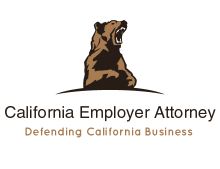 Wrongful Termination California: As a California employer and business owner how do you avoid this very common employee lawsuit?
Wrongful Termination California: As a California employer and business owner how do you avoid this very common employee lawsuit?
Like most states California is considered an “at-will” employment state, so what is even considered a wrongful termination?
Yes, it is true that California is an “at will” employment state. This basically means that you as the employer and your employees as well, can break your relationship at any time. You can fire them without having to provide some proof or cause that justifies it, and they can quit with out having to give you a specific reason.
Sounds easy right? Well you own a business in California, so I don’t have to tell you that nothing is ever that easy in the Golden State!
There are a number of “exceptions” to these at-will employment rules. If you terminate an employee under one of these protected exceptions and they can prove it, well you could be in for a headache!
Lets take a closer look at some of the areas that would not fall under the at will employment law.
The first one is very common in wrongful termination cases :
Discrimination:
If you terminate an employee based on discrimination it could be classified as a wrongful termination. California has categories that are considered “protected classes”. Some of the discrimination claims that an employee can make are age, gender, race, disability, sexual orientation and a few others.
If you sense that you are having an issue with an employee that falls in one of these categories you want to make sure you are extra careful not to give any reason for them to believe they are being discriminated against. If you do end up firing the employee you don’t want them to use some innocent comment you made in the past against you and claim discrimination.
Another one you can get in trouble for is:
Firing for Taking Protected Time Off
Maybe you have an employee who is a slacker. Always calling in sick or not showing up for work one reason or another, usually it seems when you need them most. Well just be careful you do not fire someone when they are missing work for a “protected” reason.
Some of the most common ones are taking time off for Jury duty, family leave and medical/maternity leave. If they are gone for one of these reasons and in their absence you decide your business is better off without them you will want to be very careful with what you do here. They could easily accuse you of firing them for taking one of the protected leaves.
If you want to fire an employee make sure it’s no where near the time they take one of their protected leaves (time off) absences!
Here is another big one:
Retaliation Firings
A retaliation firing is when an employee reports an employer for an illegal wrong doing and the employer retaliates by firing that employee. For example lets say an employee felt your company was discriminating against another employee and reported it. If you were to fire that employee in response, that would be considered retaliatory and is illegal.
You may have heard of this situation by it’s common name “whistle-blower protection”. It is designed to shield employee from reporting illegal acts in the work place and believe me you do not want to be accused of going after a whistle blower.
So What Do You Do?
Error on the side of caution! As you know after reading this article, California is an at will employment state BUT (and that’s a big but) if you fire someone for one of the reasons discussed you can find yourself on the wrong end of Wrongful Termination Suit.
There are a few other situations that you can be accused of wrongful termination but familiarize yourself with the ones in this article as they are the most common.
Before firing an employee ask your self if they fit or could possibly claim to fit any of these situations. Just by being aware of what is considered a wrongful termination and making sure you proceed with caution if the employee fits that situation could save you from the serious headache a claim can bring!
Normally an employers first sign that they have a complaint against them from an employee is with a notice of claim and conference. This is a notice from the Labor Commissioner informing the business of the complaint. Our article on notice of claim and conference explains it in detail but basically it is the first step in the process for an employee complaint against your business.
We are professional labor attorneys who specialize in defending California business owners against wrongful termination claims. Contact Us Today!
